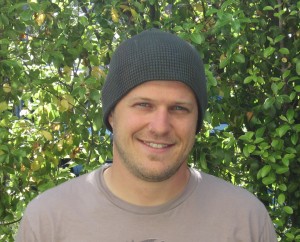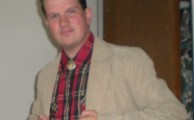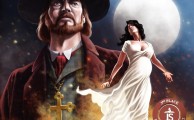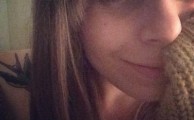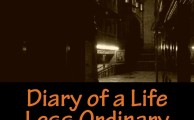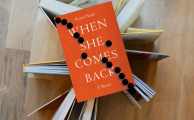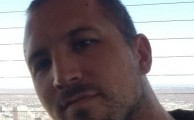Aaron Safronoff Interview
Tell us a little about yourself and your work.
I broke my neck in a roofing accident, but I still ride motorcycles. I broke my leg, some ribs, a couple of toes, and – even with a Helmet – had a Brain haemorrhage that put me in ICU for a couple of days from a motorcycle accident, and I still play hockey. In other words, I’m not terribly smart; I don’t make great decisions. Fortunately, it’s lack of intelligent choices that allowed me to pursue my love of writing, quitting an otherwise creative and fun job in the videogames industry.
Where do you like to write?
I prefer cafes, but really, I’ll write anywhere. I’ve done the tied-to-my-desk thing successfully, but I feel better being out in the world even if I’m only an observer, quietly enjoying the view of the social hive.
Is there anything you must have in order to write? For example, silence, whiskey, and a close shave.
Good question! Well, I gave up pens and pencils a long time ago – my penmanship has suffered dramatically for it – so I can’t work without some kind of typing instrument. Other than that, I’m pretty typical I suppose, I like to drink often, but I prefer Vodka to whiskey.
What books have influenced you most, both as a person and as an author?
As a person, Haroun and the Sea of Stories is a favourite, and a critical piece of fiction in my life. As an author, I suppose I’d have to say books by Philip Dick and William Gibson, but also, by Vladimir Nabokov, Evgeny Zamyatin, and Cormac McCarthy have all shaped my perspective on writing.
What is the one thing that has helped you develop most as an author?
Lots of stories persistently rattling around in my head drove me to be an author, but to develop the skill, I’d have to say it’s the revision side, after there are words on paper that helps most. Reading, re-reading, editing, and listening to my audience.
What do you want to achieve most from your writing?
I want whatever is in my head to GTFO. Seriously, I want to connect with Readers and take them on journeys they didn’t expect, and hear from them what the story was like in their eyes. Ultimately, I hope there is some art in there, but I hope to entertain, and if I’m lucky, give someone a lasting experience.
Is there something specific you do to improve your writing?
Writing and reading are the obvious answers, I suppose, and likely true, but really, I spend a lot of time paying attention to how people communicate. Listen to people, and try to understand what they mean. Live life, pay attention. Sorry, I don’t think there are easy answers here, but good writing comes from conveying powerful experience well, fictional or nonfictional.
What is the ideal relationship between editor and author?
The ideal editor understands the story in a way that helps me tell That story better, not to tell a different story.
If you had a direct line to someone who loves your writing, what would you say?
Yes. Yes. Yes! Thank you! I can’t tell you how good it makes me feel to hear you say so. What do you like best? Which stories, what characters and scenes?
If you had a direct line to someone who hates your writing, what would you say?
Ouch, hate, huh? I don’t always like what I’m reading either, even from authors I generally enjoy, but hate? That’s special. You gotta give me more info. What kind of authors and stories do you like? What did you hate about my writing?
If you could give one piece of advice to an aspiring author, what would it be?
Get feedback. Even if you know your story isn’t done, not polished enough or whatever, put it out there. Try it out on some friends, a spectrum of tastes, and just see what they say. Also, what they don’t say – if no one finishes the story, that’s a good indicator that you’re not grabbing them. The earlier you know, the better.
What does your writing future hold for you?
I Co-founded a company last year named, Neoglyphic Entertainment in order to author a new series of stories that will take advantage of digital mediums in new ways. The first part though, is story. We’ve been developing the Sunborn Rising novels (Self-promotion, not totally shameless) with me as the author and a number of friends, family, and colleagues, as the first audience. From there, we’ve reached out to an ever increasing pool of readers in a sneak peek format. The idea isn’t to write the story by committee, but to derive meaningful perspective about our audience, and find out where my telling of the story isn’t working. The first book, Beneath the Fall, will come out this year, and I’m extremely excited about it! Also, I’m interested in some collaborative work – you might know him, over at Self Publisher’s Showcase?
How have you set about the task of creating enticing cover art?
Covers are tough. Lots of advice out there, and a lot of contrary results. I went with artists and graphic designers that I trusted, and I even used 99 Designs for one cover. I would say, unless you have a background in graphic design, you probably need help to create a cover that is compelling and unique without being too busy. Look at the successful covers out there today, form your own opinion about what fits your story best, and then seek out a professional to help you develop it. 99 Designs is a valid way to get there, but it does take work to get a lot out of it, so be prepared, no matter who you hire, to go back and forth with feedback to get the cover right.
How often do you read? What genre?
Almost every day, often in the middle of the night. I read a variety of Science Fiction and Fantasy, but honestly, I read based on friend recommendations more than genre, reviews, or any other factor. I’m halfway through, “The Fault in Our Stars,” right now, for instance, and enjoying it.
Thanks for taking the time to answer our questions. Best of luck in the future, Aaron.







